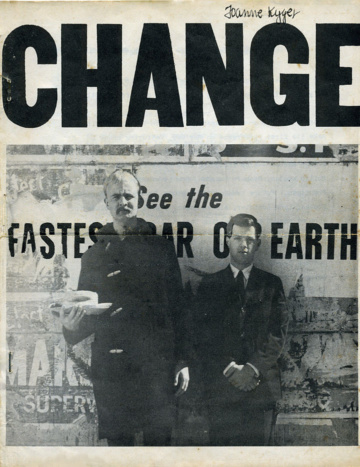Change
Richard Brautigan and Ron Loewinsohn
San Francisco [1963].
Change vol. 1, no. 1 [1963]. Sole issue.

Joanne Kyger:
I remember, in the winter of 1964, coming back from Japan, where I had lived for four years, and realizing that Richard was almost a different person. He and Ron Loewinsohn had started a magazine, Change, in 1963, and I had sent them some poems to publish. Despite its title it was a very modest typing-paper size stapled publication with a photo of Richard and Ron looking very solemn. Only one issue came out.
The cover photograph is by Joan Gatten, the wife of Ron Loewinsohn; Brautigan was living with the couple at the time. Change included work by Philip Whalen, Bob Miller, Hugh Madden, Robert Duncan, Ken Irby, Joanne Kyger, Gerald Gilbert, Richard Duerden, and the editors. According to Loewinsohn, the magazine folded after the first issue due to the difficulty of working with Brautigan.
Don Carpenter, one of Brautigan’s closest friends, wrote the following in an unpublished memoir:
Back then it seemed possible to take control of American literature by simply starting your own magazine, printing your friends, and letting the world come to you. City Lights bookstore was a tiny triangle of cramped space with Shigeyoshi (Shig) Murau at its center, behind the cash register. The front rack, under the window and to Shig’s left, was littered with hopeful new poetry magazines, ranging in price from FREE to $10.00. Brautigan and his friend Ron Loewinsohn decided to add to this blizzard of literature.
Change was the name of their magazine, a bold announcement of what was about to happen to the world of art and letters. Change was mimeographed on cheap 8 x 10 paper. It was priced at one dollar per issue and four dollars for a year’s subscription. Brautigan and Loewinsohn met me at a cafe on the corner of Columbus and Pacific. The place was shabby and full of poets, all glowering at each other and themselves. We sat near the window and glowered out at the citizens passing by. Ron Loewinsohn was and is a small handsome man with snapping eyes and a bright laugh, a poet with ambitions.
To keep us from being thrown out, I ordered coffee and probably paid for it, too. After all, they were poets and editors, and I was only a part-time teacher. Over coffee they talked and I listened. Their magazine was ambitious—they would be printing in their first issue Gary Snyder, Philip Whalen, Jack Spicer, Robert Duncan, and I don’t remember who-all. It sounded pretty good to me, and I said so.
“That’s just it,” Richard said, looking at me fondly. “We would like to offer you the position of first subscriber.”
I didn’t know whether to be flattered or insulted. Had they combed North Beach and discovered that I was the only person they knew with four dollars? Maybe so, but I decided to be flattered.
“Thank you,” I said, and forked over the money.
Some time later I got my copy of Change, volume one, number one. As advertised, it was full of poets who have now, with the passage of more than twenty years, become famous as the centerpieces of the Beat. I still have my copy, tucked away in lightsafe storage. Volume One, Number One was, of course, the only issue of the magazine to appear.
There is more to life than editing other people’s work, Brautigan and Loewinsohn must have decided. As for me, their only subscriber (it turned out), they owed me three dollars. At that time, three dollars was a hell of a lot of money, and I frankly never expected to see it again.
But no. These were honorable men. About three months after I had forgotten all about the whole thing, Richard came up to me on the street.
“Ah,” he said, “I’ve been looking all over for you. Where have you been keeping yourself?”
I explained that I had a wife and family over in Noe Valley, and that domesticity and work kept me out of the Beach, often for days at a time.
Not hearing the sarcasm, Richard pulled out an envelope and handed it to me. “This is yours,” he said. “Your refund from Change.”
I was very pleased. In the world of poetry, in the North Beach of then, money was a scarce item. This bit of businesslike honesty was endearing to me. I liked Brautigan better than ever.
The fact that the envelope contained three-cent stamps instead of cash was irrelevant. People can always use stamps.
— Don Carpenter, My Brautigan: A Portrait from Memory. Quotation from John Barber’s website, BRAUTIGAN.net.
